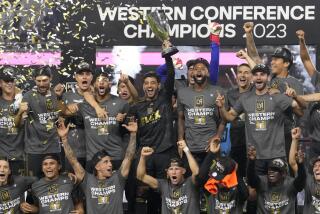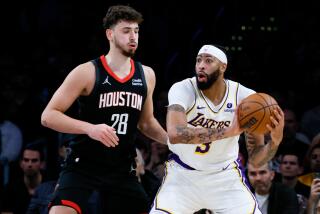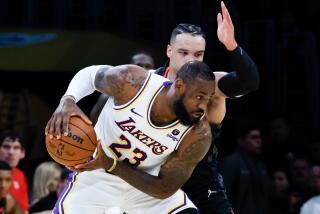On the Brink : For Some Reason, Defending Champion Rockets Seem to Play Better There
There are people who think the Houston Rockets are one of the NBA’s great teams. There are other people who think they’re a pretty good team that pulled off a miracle and followed it up with a bigger one.
Either way, NBA history is never going to forget the Rockets.
This is a madcap bunch that underachieved for years, got serious enough to win an NBA title, avoiding elimination in four playoff games on the way . . . then remade themselves the next season until only five players remained from the first championship . . . and then avoided elimination in five more playoff games to win their second title in succession.
If that’s a dynasty, they don’t make dynasties the way they used to. But maybe people simply don’t appreciate what the Rockets have done.
“You go and look at the great teams,” says Coach Rudy Tomjanovich, in Los Angeles for games against the Lakers and Clippers.
“First of all, they’re so good, they don’t get in that situation. They don’t get into elimination games. But there’s nobody that has a record like that and no one ever will.
“The heart and guts--[Charles] Barkley said the Rockets are like a Texas roach. You can step on it and whatever and it still ain’t dead. It’s like a snake. You cut it up in pieces and it’s still moving around. . . .
“It’s amazing. I think everybody on Earth should go through a situation like that, a pressure situation where there’s a big downside--lose and it’s over. And then win. Just do it once and the feeling you’ll have for your co-workers is amazing.
“We did it nine times, so you can imagine how it feels.”
Barkley was speaking from experience. His Phoenix Suns had the Rockets down, 2-0, in the ’94 playoffs and 3-1 last spring.
In 1994, Phoenix won the series opener at Houston in front of so many empty seats, Sun President Jerry Colangelo whipped up an impromptu promotion, buying as many tickets as he could for Game 2, raffling them off in Phoenix and flying the lucky Sun fans to Texas on the team charter, renamed the Chuck Wagon.
When the Suns won Game 2, Houston fans booed and both local papers ran the same banner headline: “CHOKE CITY.”
Then the Rockets came back to win that series, 4-3, rolled over the Utah Jazz and came from 3-2 down in the finals to beat the New York Knicks.
And that was their easy championship.
Amid great skepticism, which the players insisted only increased their motivation, the Rockets started defense of their title last season by going 9-0.
Perhaps proving the skeptics had a point, they then hit a serious plateau. On Feb. 14, they were 30-17 and in a virtual tie with the Lakers for fifth in the West, and Tomjanovich did what he had vowed not to: break up his championship team.
“I really believe in stability and don’t like to wind up making a lot of changes,” Tomjanovich says. “But we wound up changing, through necessity or opportunity.
“The Clyde [Drexler] deal, before that even came about, we had organizational meetings and I just said in a general sense, ‘I don’t think we ought to make any trades. These guys won the championship and let’s give them the chance to do it.’
“Then this Clyde thing came in and we had had some problems. We were struggling a bit. . . .
“We thought about all the different issues--trading during the course of the season is very tough. They usually don’t work. A high-profile scoring player coming into a team with another high scorer--that one was OK because these guys [Drexler and Hakeem Olajuwon] are great friends. [With] somebody else, there would have to be that adjustment: ‘Why is he getting all this?’
“And then Clyde was coming back to Houston, and wanting to be there, you knew he’d do anything possible to make it a good situation. He had been close to winning a championship and now, feeling close on this team that he could do it. There were some positives there.”
There were some negatives too, or at least some bad luck. The Rockets had traded power forward Otis Thorpe to Portland for Drexler, whereupon Thorpe’s backup, Carl Herrera, was lost to injury, along with starting small forward Robert Horry. Vern Maxwell suspected Drexler’s arrival wasn’t a tonic for his career. Maxwell’s buddies, who sat with him in the back of the airplane, which they called “the ‘hood,” sympathized with him.
The Rockets went 17-18 with Drexler and finished No. 6 in the West, meaning their opponents would have the home-court advantage throughout the playoffs.
In the first series, the Rockets trailed the Utah Jazz, 2-1, then won Game 4 in Houston and Game 5 in Salt Lake City. In Game 5, they trailed by 12 points late in the third quarter.
“I remember one shot Olajuwon hit,” says Jazz personnel director Scott Layden. “You know how he turns to the baseline for a fall-away jumper? It grazed the backboard and went in. When those things happen, you wonder if it’s been taken out of everybody’s hands. It’s destiny.”
Houston moved on to a rematch with the Suns, who, to no one’s surprise, took a 3-1 lead. The Rockets then shocked the world all over again, rallying to win the series while being outrebounded by seven a game.
In the Western finals, Olajuwon proved he was not only better than San Antonio’s David Robinson, it wasn’t even close. The Rockets won, 4-2.
Then they wiped out a 20-point deficit in Orlando in Game 1 of the finals, tied it at the end of regulation on Kenny Smith’s three-point basket and won in overtime on Olajuwon’s rebound basket at the buzzer. After that, the Magic went quietly.
“That team,” an admiring Penny Hardaway said. “You look at it on paper, you’d say, ‘How does this team win?’ But their hearts are just as big as any team’s in the NBA.”
This fall, Olajuwon sat out all of the exhibition season and started slowly. In the first 11 games, the Rockets were outrebounded by an average of six. They went 10-1.
“I don’t know,” Tomjanovich says, laughing, “I can’t explain that whole deal.”
Once volatile, the Rockets are now as veteran as veteran can be. Maxwell, who stepped up to make some big shots for them in the ’94 finals, took a hike on them early in last spring’s playoffs and after that, the chemistry was fine. Now everyone knows his role and is happy with it. Whatever you say about Maxwell, he gave the Rockets just what they needed to win both of their titles--one by his presence, the other by his absence.
They are in their annual post-November fade, but they’re still fighting it out with the Spurs and Seattle SuperSonics for best in the West. Whatever else happens, they already belong to the ages.
More to Read
Go beyond the scoreboard
Get the latest on L.A.'s teams in the daily Sports Report newsletter.
You may occasionally receive promotional content from the Los Angeles Times.










